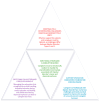The Impact of Patient-Centered Care in Bipolar Disorder: An Opinion on Caregivers' Quality of Life
- PMID: 40217660
- PMCID: PMC11989817
- DOI: 10.3390/jcm14072209
The Impact of Patient-Centered Care in Bipolar Disorder: An Opinion on Caregivers' Quality of Life
Abstract
Background/Objectives: Our background comprises the previously identified consequences of bipolar disorder's chronicity, which significantly affects not only the patients but also their caregivers, leading to challenges in caregivers' physical, emotional, and financial well-being. This impact on caregivers' quality of life (QOL) is often overlooked in the context of patient-centered care for bipolar disorder. Our objective was to explore how patient-centered care in bipolar disorder management affects caregivers, with a focus on improving both patient and caregiver outcomes. Methods: We performed a thematic qualitative synthesis of reviewed literature and case studies to explore the intersection of patient-centered care in bipolar disorder management and its impact on caregivers. This comprehensive review allowed us to identify key behavioral patterns and emotional fluctuations in patients that significantly affect caregiver well-being, with a focus on the challenges caregivers face due to the unpredictability of mood episodes and the lack of adequate support in current care models. Results: In the results, we identified that while patient-centered care enhances patient outcomes, it also exacerbates the strain on caregivers if their needs are not adequately addressed. Specific behavioral pathways and emotional fluctuations in bipolar disorder impact caregivers, such as the unpredictability of mood episodes, cognitive distortions during manic and depressive phases, and the emotional toll of managing crises. This article also emphasizes the role of patient-centered care, which places the patient at the core of treatment decisions, but often neglects the strain placed on caregivers. Conclusions: We conclude that a holistic approach to care, which includes caregiver support and resources, is essential for improving the QOL of both patients and caregivers. Future research is needed to develop strategies and interventions that better support caregivers and enhance their overall well-being, ensuring that patient care models are truly comprehensive.
Keywords: bipolar disorder; caregivers; mood episodes; patient-centered care; psychotherapeutic and educational strategies; quality of life.
Conflict of interest statement
The authors declare no conflicts of interest.
Figures

Similar articles
-
The burden on informal caregivers of people with bipolar disorder.Bipolar Disord. 2005;7 Suppl 1:25-32. doi: 10.1111/j.1399-5618.2005.00191.x. Bipolar Disord. 2005. PMID: 15762866 Review.
-
The health and well-being of caregivers of children with cerebral palsy.Pediatrics. 2005 Jun;115(6):e626-36. doi: 10.1542/peds.2004-1689. Pediatrics. 2005. PMID: 15930188
-
Remotely delivered information, training and support for informal caregivers of people with dementia.Cochrane Database Syst Rev. 2021 Jan 4;1(1):CD006440. doi: 10.1002/14651858.CD006440.pub3. Cochrane Database Syst Rev. 2021. PMID: 33417236 Free PMC article.
-
Caregiver burden in older adults with bipolar disorder: relationship to functionality and neuropsychiatric symptoms.Psychogeriatrics. 2017 Sep;17(5):317-323. doi: 10.1111/psyg.12241. Epub 2017 Jan 27. Psychogeriatrics. 2017. PMID: 28130857
-
Randomized trial comparing caregiver-only family-focused treatment to standard health education on the 6-month outcome of bipolar disorder.Bipolar Disord. 2018 Nov;20(7):622-633. doi: 10.1111/bdi.12621. Epub 2018 Mar 12. Bipolar Disord. 2018. PMID: 29528180 Clinical Trial.
References
-
- Perlick D.A., Rosenheck R.A., Miklowitz D.J., Kaczynski R., Link B., Ketter T., Wisniewski S., Wolff N., Sachs G., STEP-BD Family Experience Collaborative Study Group Caregiver burden and health in bipolar disorder: A cluster analytic approach. J. Nerv. Ment. Dis. 2008;196:484–491. doi: 10.1097/NMD.0b013e3181773927. - DOI - PMC - PubMed
-
- National Institute of Mental Health Bipolar Disorder. [(accessed on 27 February 2025)]; Available online: https://www.nimh.nih.gov/health/topics/bipolar-disorder.
LinkOut - more resources
Full Text Sources

